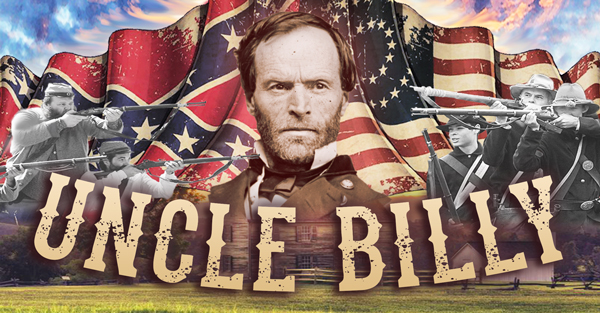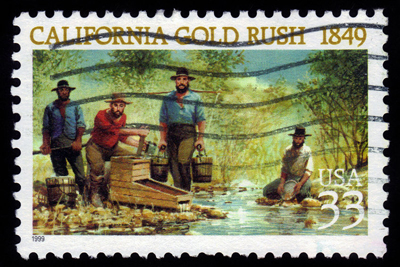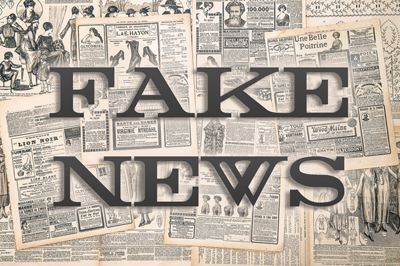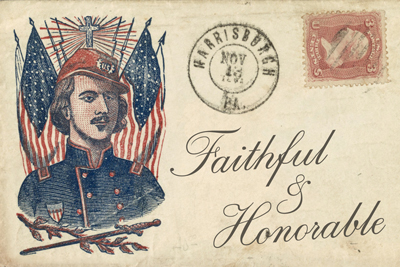Way back in the day, I went to Sherman Elementary School. Where I live now, there is a little part of the city called Shermantown. So I kind of figured I had better read a book about General Sherman, since he has probably impacted my life more than I know.
Pre-Civil War Years
Tecumseh Sherman was actually named after a great Shawnee Indian warrior and chief. Interestingly, later in life, he would lead a lot of battles against the Indians in the West. His father died when he was nine years old. Think about that for a second. How would the loss of your father affect you as a person and especially as a young man who so looks up to his father? His father had left the family in financial straits. His mother could not afford to take care of all their children, so some of them went to live elsewhere. Young Sherman actually lived next door at the house of his neighbor, Thomas Ewing. Also, very interestingly, he married one of Thomas Ewing’s daughters. He began his military career as a West Point graduate but left the Army for a while to become a banker in St. Louis, which became his favorite city. From there, he went to California and worked as a banker in San Francisco as the Gold Rush was beginning. Money and finances weighed heavily on him his entire life. His dad had not left enough to take care of the family, and he worried he would do the same to his own family.
At West Point, he developed a love for the French language! Why was he a lover of French? At the time, most of the great military strategy books were written in French, and he wanted to read them. Little did he know, but many books would be written about him and the military strategies he used to win battles and wars during his lifetime.
The Need for Order
One thing of utmost importance to General Sherman was order. He had seen the disorder of his life when he was young, and it caused him to seek order his entire life. When the South seceded from the North in 1860, it sparked him to go back into the military. He wanted order, and he wanted order for the United States. He had a deep love for this country, and he did not want to see it broken apart.
There are two interesting things about him that you may not know. He loved the people of the South. He had worked in Florida, South Carolina, Alabama, and Louisiana. He enjoyed the culture of the South. He was the headmaster of a military academy in Louisiana when Louisiana seceded from the Union in 1861. He knew he would have to return to the North. He needed order. Interestingly, that military academy would eventually become Louisiana State University. General Sherman was also not an abolitionist. In a lot of his writings, he seemed fairly prejudiced. But one reason he was okay with slavery, in his mind, was that it created order. There was an order to the South while he lived there. Remember that order was what he sought most of his life.
Setting the Record Straight
Newspapers of the time printed headlines that called him insane—like, literally, insane. Sherman had merely requested more troops because he didn’t want a lost battle on his conscience. And, of course, he was the furthest thing from being crazy! Just a short time later, his decisive leadership won the Battle of Shiloh. Then the papers were lauding him! So what did we have back in the 1860s? That’s right: Fake News!! Goodness, we can’t get away from this in America! Be careful what you read because it can influence you much more than you will ever know.
He was also famous for a couple of statements that are still in use today. He said that he would, “make Georgia howl.” He knew how tough Southern people were, so he knew he had to wage a psychological war. Conditions had to get so bad that mothers, wives, and children would want the men to stop fighting. He is also credited with the term, “War is hell.” In one battle, his horse was shot out from under him three different times! Not exactly sure why the fourth horse volunteered to give him a ride! He described the wounded on the battlefields and the hellish groans and sounds they made. The men who lost limbs. The casualties and injuries of war weighed heavily on his soul, and he wanted the war to wrap up as quickly as possible with a victory.
After the war, on more than one occasion, many people tried to get him to run for President. But he hated politics!! Absolutely hated it. He became great friends with Ulysses S. Grant. They were both Union generals. He liked the way Grant conducted himself and could sit and talk with him for hours. But when U. S. Grant became President, Sherman noticed a change in him. He was no longer that bold man he once knew as a general. Grant began to play the game of politics, and General Sherman did not like that. Sherman saw what politics did to his friend, and he didn’t want the same to happen to him. But, as you probably know, there is a lot of disorder in politics, and that was not to his liking.
General Sherman was also a huge reader:
“His favorite author, however, was William Shakespeare. He attended his plays and frequently quoted him. But he admired other writers, too. Often have I hung on the mellifluous lines of Walter Scott, the impassioned lines of Lord Byron, and the inimitable verse of Robert Burns,” he said. He read to his young children from Charles Dickens, Washington Irving, and Walter Scott, and later in life, advised Minne (his daughter) that ‘Scott, Dickens, and Washington Irving [were] as necessary to fix the tastes of the young as was the Bible and Shakespeare, and ‘no home was complete without’ them.”1
Do you see any problem with his statement?
“Still, he began referring to his inevitable demise. He saw time ‘fleet[ing] by with race-horse speed,’and on more than one occasion openly talked about the approach of death.”2
All people realize this at some point. Have you realized it yet?
“He spent most of the day reading one of his favorite authors, Charles Dickens: Great Expectations.”3
General Sherman would die in a few days. If you had one very last book to read before you died, what would it be and why?
Keeping the End in View
But something hit me as I was finishing up Sherman: A Soldier’s Passion for Order by John F. Marszalek. The last chapter, “A Full Life Ends,” was twenty pages long. The book contained 500 pages of writing, which means that only four percent of the book was dedicated to the end of his life. Now, it turned out to be even less than that because only the last four or five pages of that chapter talked about his death. I knew when I bought the book that the majority of it would be about the Civil War. That was a no-brainer because it is what General Sherman is known for. But only four percent of the book was about his death?
In the gospel of Mark, starting in chapter 10 verse 32, Jesus and the disciples are heading to Jerusalem. Their journey would climax with the death, burial, and resurrection of Jesus Christ. So, when you do the math, literally 40 percent of the gospel of John is about the death of Jesus Christ, yet most biographies about individuals include only a few pages about their death. That got me thinking. Jesus is God. Everything about His life is 100 percent important. But is God trying to tell us something here? Something like, “Don’t you dare miss the death and resurrection of My Son, Jesus. It explains to you how He is the perfect blood sacrifice for your sins and why you will need His sacrifice when you stand before Me.”
But, as we look around, we see that people tend to emphasize the major events of one’s life: Where were you born? Where did you go to college? What do you do for a living? Tell me about your family. What kind of car do you drive? So why isn’t 40 percent of our lives being spent talking about how we became born again, how we are preparing for death, and where we expect to spend eternity?
I told someone recently that if I walk out of here soon, I will have had a good run. That is a basketball term. It means going into a gym and playing really well for five or six straight games. Maybe you pull it off and play great for two hours. You grab your bag, sling it over your shoulder, and feel satisfied that all of the hard work paid off. You had a good run. But are we having a good run, so to speak, spiritually? Are people seeing in us an eternal life being lived out in a temporary body? An 84-year-old friend and an 88-year-old acquaintance of mine went to Heaven recently. Goodness, what a welcome they must have had! In this life, they told story after story after story that had eternal value. Living sold-out for Jesus was evident in their lives and evident in their deaths.
Who Orders Your Steps?
Psalm 119:133
Order my steps in thy word: and let not any iniquity have dominion over me.
What William Tecumseh Sherman needed was order. He needed his steps to be ordered by God’s Word. He grew up with some Presbyterian training, but his wife was a dyed-in-the-wool Catholic. He wanted nothing to do with Catholicism, and when one of his sons decided to become a Catholic priest, it literally almost destroyed him.
1 Corinthians 15:22,23
For as in Adam all die, even so in Christ shall all be made alive. But every man in his own order: Christ the firstfruits; afterward they that are Christ’s at his coming.
You see, there should have been a different order to General Sherman’s life. That order should have been God first above all else, and then everything else—including this great Union well below that.
Caring for the Souls of Men
General Sherman was affectionately known as “Uncle Billy” by his troops. He could hang with generals and hang with volunteers. They said he was comfortable with people from all walks of life. No one was below him. Does that remind you of anyone? When President Lincoln wanted to talk, General Sherman would talk with him. When a freed slave wanted to chat, he would chat with him. He had no problem leading his men into battle. He was totally respected by his men. They adored him for years and years after the war. It made me wonder who, among all of those admirers, cared for Uncle Billy’s soul? Who took the time to witness to him? He was a huge reader who collected many written works. One of the books he owned was the Bible. Did he take it seriously, or was it just one of the great works of antiquity that he thought everyone should read?
Ulysses Grant, President Abraham Lincoln, James Buchanan, Andrew Johnson, Rutherford B. Hayes, James Garfield, Robert E. Lee, Stonewall Jackson, Jefferson Davis, James Longstreet, Braxton Bragg, George Pickett, George Custer, P. G. T. Beauregard, Nathan Bedford Forrest, and many others were some of the fascinating characters I read about in this book. But one thing hit me as I was reading: Everyone in this book is dead. Every one of them is on the other side now. Every one of them is in Heaven or Hell, depending on what they did with the cross of Jesus Christ. That was a very sobering thought. Remember, any book that might be written 150 years from now about your life and about all of your friends and about all of your acquaintances would mean that you and every one of them are on the other side. What would be recorded about how you impacted their eternal destinations, where they will reside forever and ever and ever?
One name in the book was General O. O. Howard. He was known as “the Christian General.” Earlier in his life, he had committed his life to Jesus and almost left the military. He was working with General Sherman during the very famous March to the Sea. Did he witness to General Sherman? Did he tell him that Jesus is the only way to get to where he wanted to go for eternity? Did he let him know that the only order anyone can have in their life is found by following the Word of God? If there are any Uncle Billy’s in your life that you want to see in Heaven, make sure you invite them to come.
“William Tecumseh Sherman chose his own epitaph, Faithful and Honorable, and it was an accurate assessment of a life that had never been easy but was accomplished.”4
Always remember that if your tombstone reads, “Faithful and Honorable,” it was because you were faithful to the Lord and honorable in how you lived your life for Him.
Until the nets are full,
Footnotes:
1 John F. Marszalek, Sherman: A Soldier’s Passion for Order (New York, NY: Free Press; First Edition first Printing edition, 1992), p. 483,484.
2 Ibid., p. 490.
3 Ibid., p. 491.
4 Ibid., p. 499.








